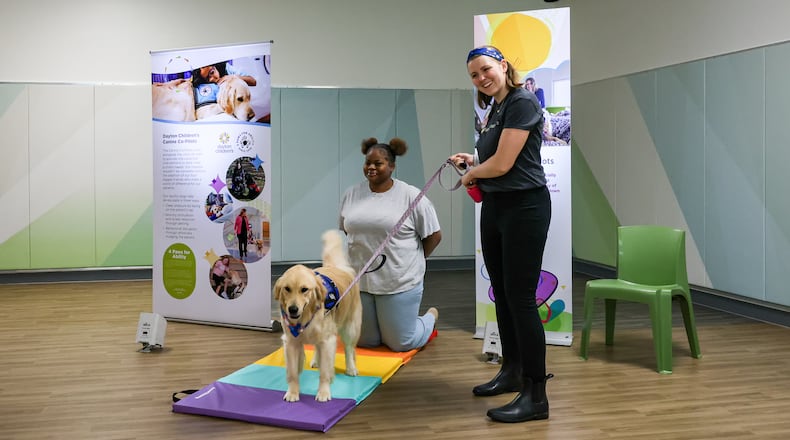“We have actually done studies where we’ve shown that these dogs help de-escalate kids,” said Dr. Kelly Blankenship, associate chief medical officer of mental health at Dayton Children’s Hospital.
By helping to de-escalate, Dayton Children’s canine co-pilots help keep children from having to be restrained or receive intramuscular medications, which provide rapid relief for emotional distress.
This is data they’ve also published and shared with other children’s health systems, Blankenship said.
Piper joined the team in February of this year, and since then, she’s helped children make progress on their healing journeys.
“We had a kid on our unit that, they were so nervous to leave their room to go to groups and we were really struggling to get the child to engage in groups and talking groups, so we had Piper escort this child to groups and sit with this child in groups,” Blankenship said.
Within a day, that child became one of the top contributors in group sessions, Blankenship said.
“It really is amazing what these dogs can do for our kids,” she said.
Dayton Children’s facility dogs are trained by 4 Paws for Ability, an organization in Xenia, for medical procedures and situations.
Training starts when the dogs are a few days old and continues until they are about two years old, said Megan Calabro, director of child life at Dayton Children’s. The dogs will retire when they are around eight years old.
The Mathile Center has space specifically for Piper and other future canine co-pilots.
“Hospitals need to have a devoted facility dog office, and that’s a space that the dog is able to take rest in,” Calabro said.
“I like to think of facility dogs kind of as a preschooler,” she said. “They need a couple naps in their day, and they need time to play as well.”
The dogs also need a devoted green space.
“We’re really lucky that the Matilda Center has a devoted green space with pet turf around back so the dogs don’t get muddy or dirty at all when they go out to play,” Calabro said.
Dayton Children’s follows other guidelines, as well, to make sure the dogs stay healthy and the interactions with children stay safe, she said.
Each day, Piper goes with her handler, Taylor Rieck, as they meet with doctors and mental health specialists to discuss which patients might benefit from having a visit from Piper. Those can include children who are struggling to engage with their care team or having trouble adjusting, Rieck said.
Staff may have Piper see some patients individually, and then Piper will also be a part of group sessions, Rieck said.
Some of Piper’s de-escalation techniques include lying on the child’s lap or other trained behaviors to help provide a positive distraction.
“She’s able to offer deep pressures, kind of like a weighted blanket to help calm a child (who is maybe) overwhelmed,” Rieck said.
Piper can also do other forms of behavior disruption, such as getting close to a child who, after doctors know the child is comfortable with a dog, may be crying or in emotional distress.
“That brings kind of some light to the moment. It can kind of help them focus on her,” Rieck said. “She’s very attentive to any changes in behavior.”
About the Author

